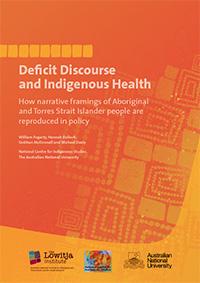Deficit Discourse and Indigenous Health: How narrative framings of Aboriginal and Torres Strait Islander people are reproduced in policy
This report explores ‘deficit discourse’ in Aboriginal and Torres Strait Islander health policy. ‘Discourse’, in this context, encompasses thought represented in written and spoken communication and/or expressed through practices. The term draws attention to the circulation of ideas, the processes by which these ideas shape conceptual and material realities, and the power inequalities that contribute to and result from these processes. ‘Deficit discourse’ refers to discourse that represents people or groups in terms of deficiency – absence, lack or failure. It particularly denotes discourse that narrowly situates responsibility for problems with the affected individuals or communities, overlooking the larger socio-economic structures in which they are embedded. Understanding how deficit discourses are produced and reproduced is essential to challenging them. Thus, this report examines various aspects of deficit discourse in policy, but in particular considers deficit metrics: the ways in which Aboriginal and Torres Strait Islander Australians are homogenised and statistically compared to non-Indigenous Australians.
- A summary report is also available
- Visit the project page
| Author | W. Fogarty, H. Bulloch, S. McDonnell & M. Davis |
|---|---|
| Type | Publications |
| Year | 2018 |
| Download |
 |

